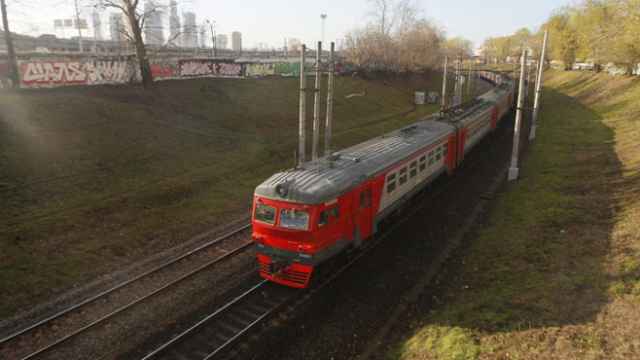State monopoly Russian Railways said Thursday that it would reinstate 300 suburban train routes after cancellation of the vital services drew a sharp rebuke from President Vladimir Putin.
About 40 routes have already been returned to train schedules, the company said in a statement.
The cancellation of hundreds of suburban passengers trains across more than 20 Russian regions sparked outrage across the country in recent months and on Wednesday drew a stinging response from Putin.
"What, have you all gone mad?" Putin told government officials. "We understand how serious this is. It's not just one bus route that's been canceled. Suburban trains have stopped running in the regions!"
Putin directly castigated Arkady Dvorkovich, the deputy prime minister who oversees the sector. Dvorkovich said on Thursday that 41 suburban train routes had been restored in the Pskov, Tver, Chelyabinsk, Sverdlovsk and Moscow regions, news agency Interfax reported.
The trains, which are largely loss-making but an essential feature of many Russians' lives, have in recent years been caught in a fierce tug-of-war between Russian Railways and the regional governments.
The debt-ridden regions are increasingly hard put to pay the difference between the market value of the services — which is defined by Russian Railways — and the amount that residents can realistically pay for tickets.
Meanwhile, Russian Railways has put all the blame on the regional governments for failing to pay what it considers its due. The rail monopoly's announcement Thursday did not clarify how the resumed routes would be paid for.
"It is a war between a state monopoly and the regions," Natalya Zubarevich, director of the regional program of the Independent Institute for Social Policy in Moscow, told The Moscow Times previously.
A Message from The Moscow Times:
Dear readers,
We are facing unprecedented challenges. Russia's Prosecutor General's Office has designated The Moscow Times as an "undesirable" organization, criminalizing our work and putting our staff at risk of prosecution. This follows our earlier unjust labeling as a "foreign agent."
These actions are direct attempts to silence independent journalism in Russia. The authorities claim our work "discredits the decisions of the Russian leadership." We see things differently: we strive to provide accurate, unbiased reporting on Russia.
We, the journalists of The Moscow Times, refuse to be silenced. But to continue our work, we need your help.
Your support, no matter how small, makes a world of difference. If you can, please support us monthly starting from just $2. It's quick to set up, and every contribution makes a significant impact.
By supporting The Moscow Times, you're defending open, independent journalism in the face of repression. Thank you for standing with us.
Remind me later.





